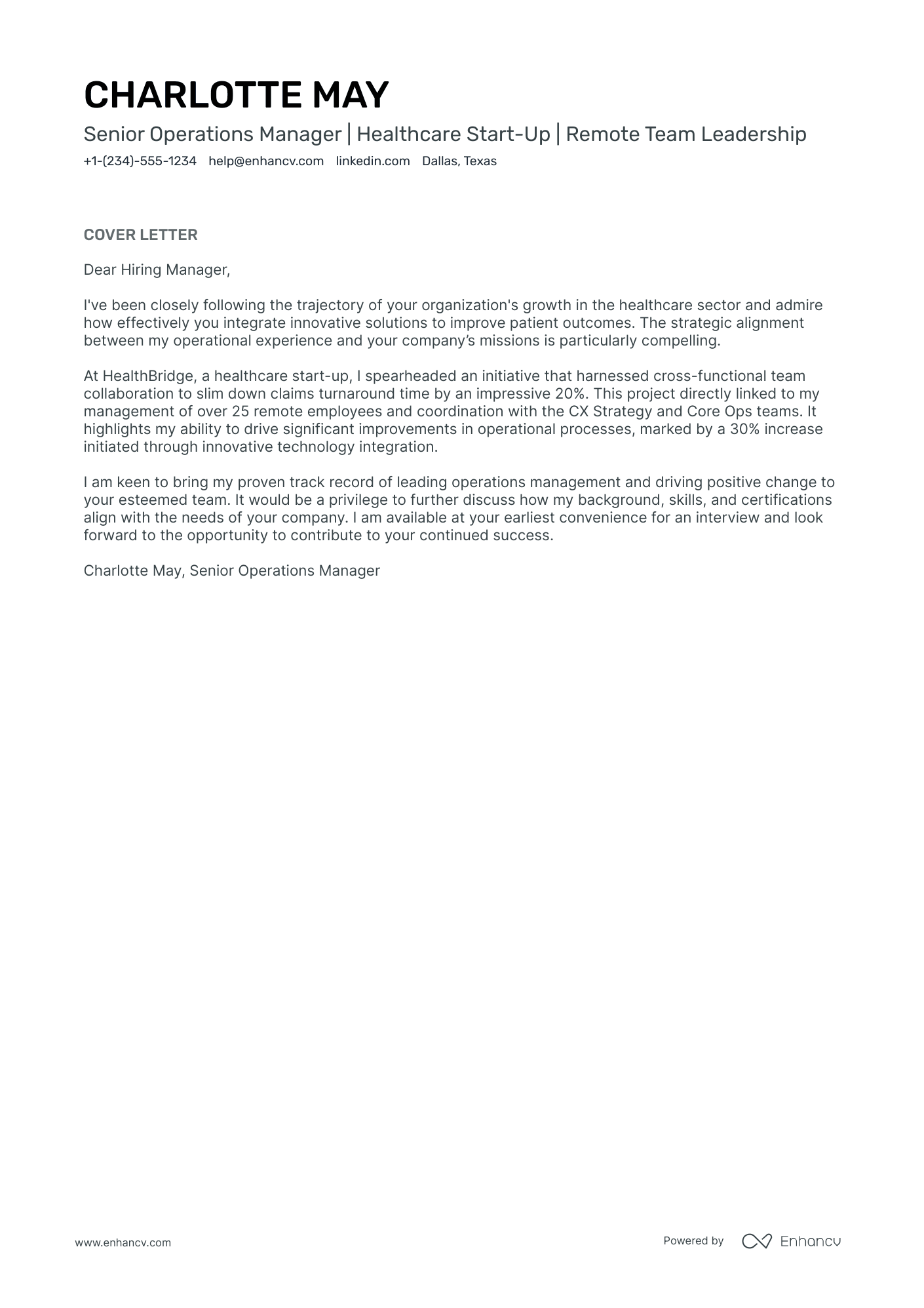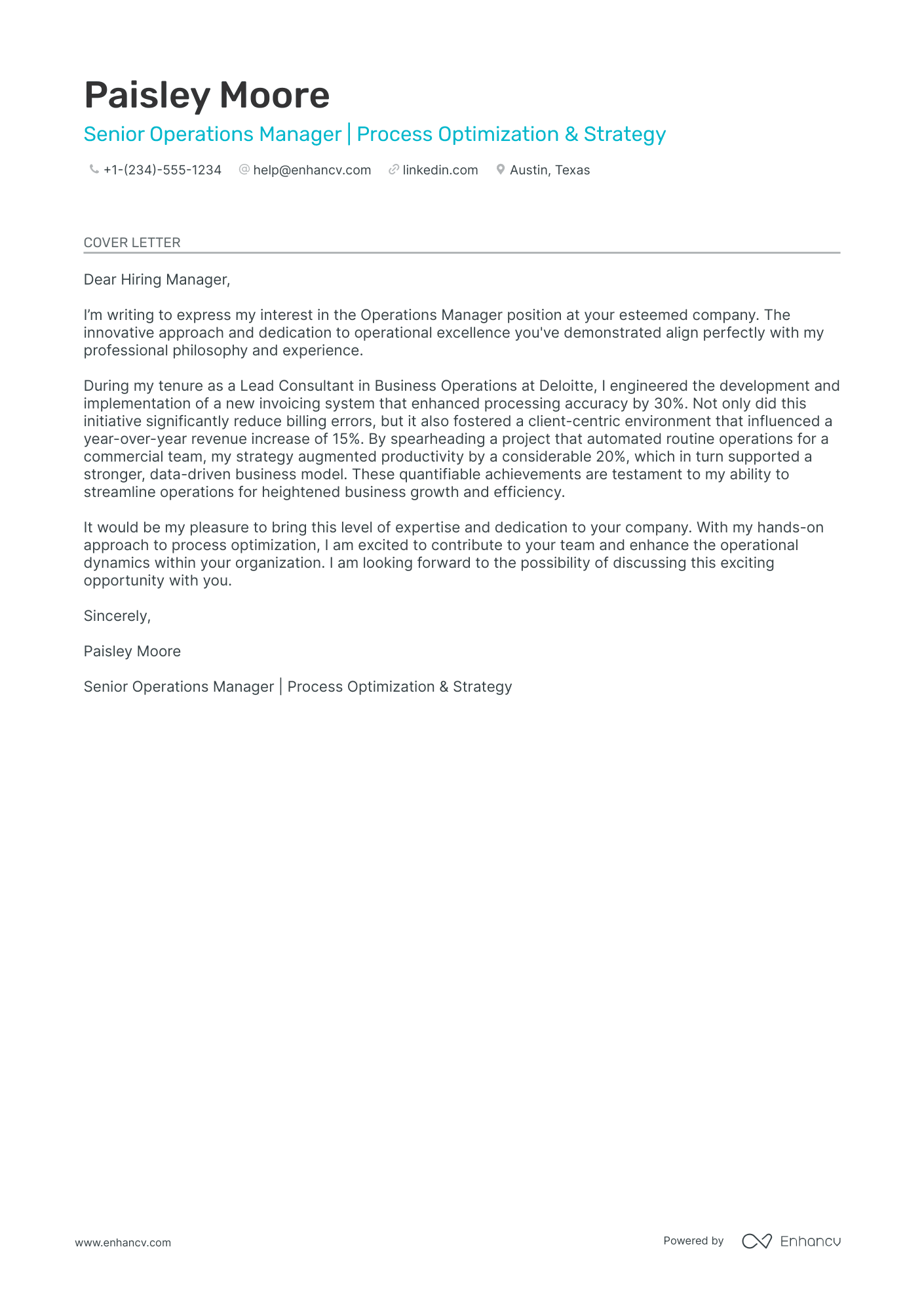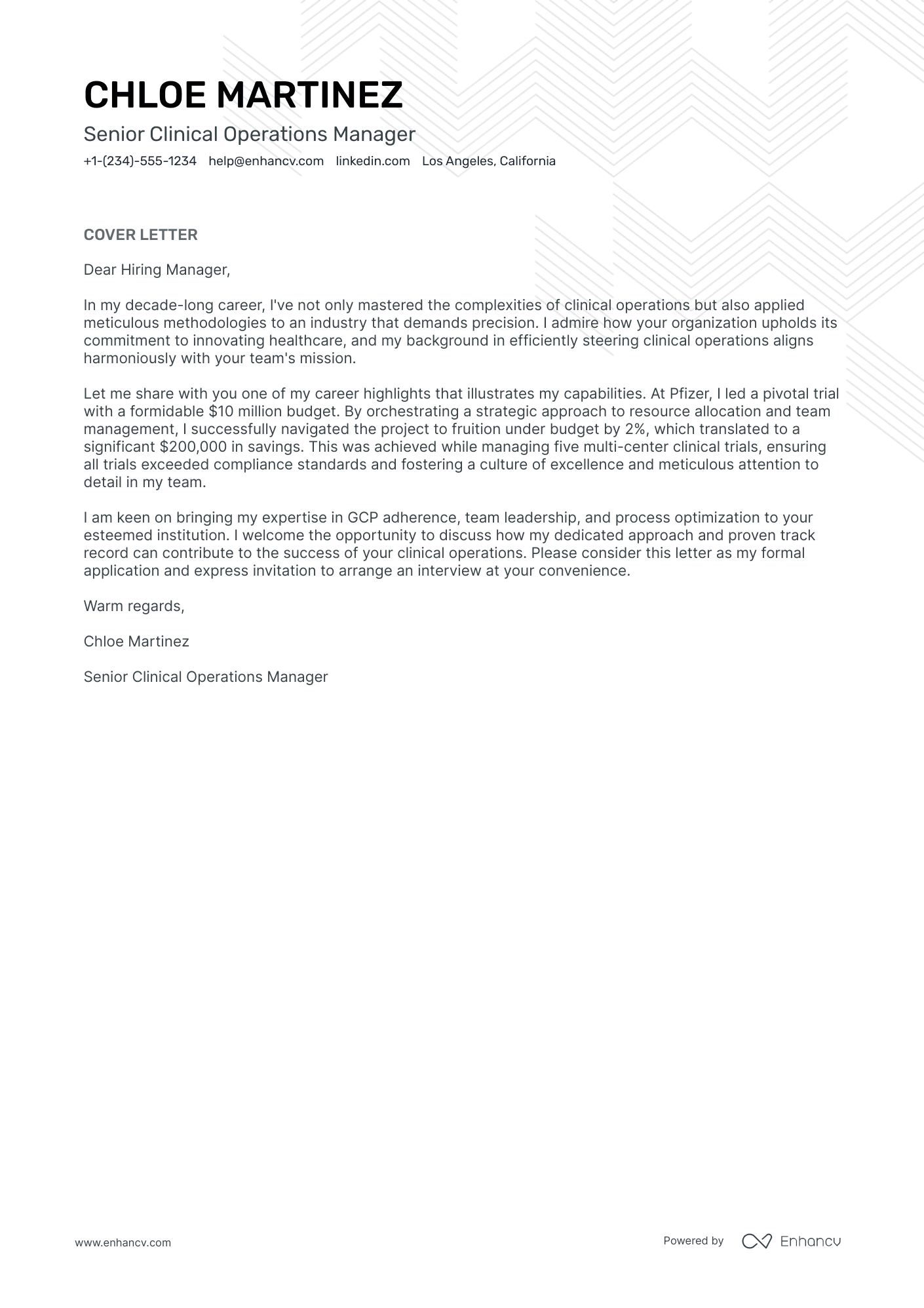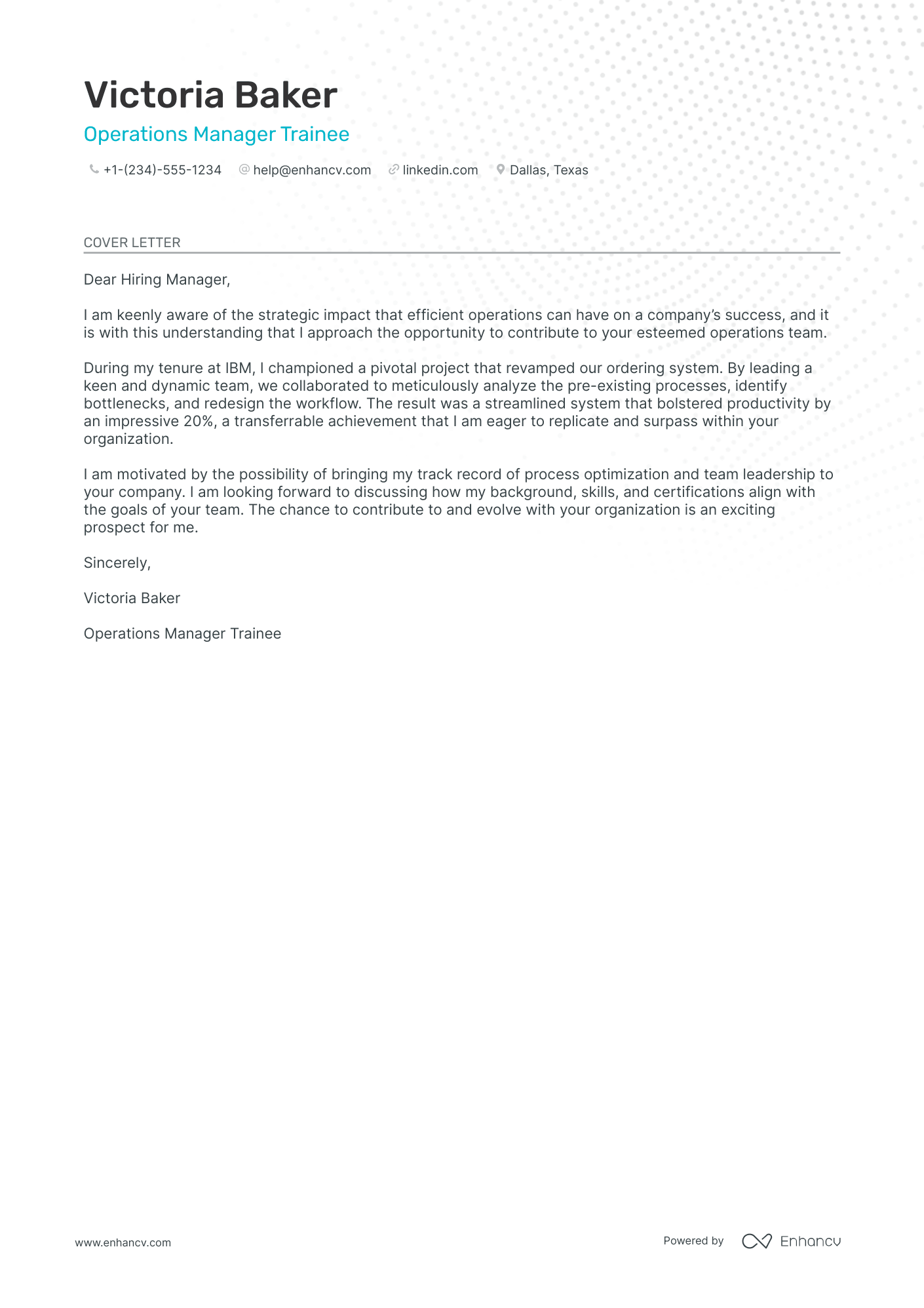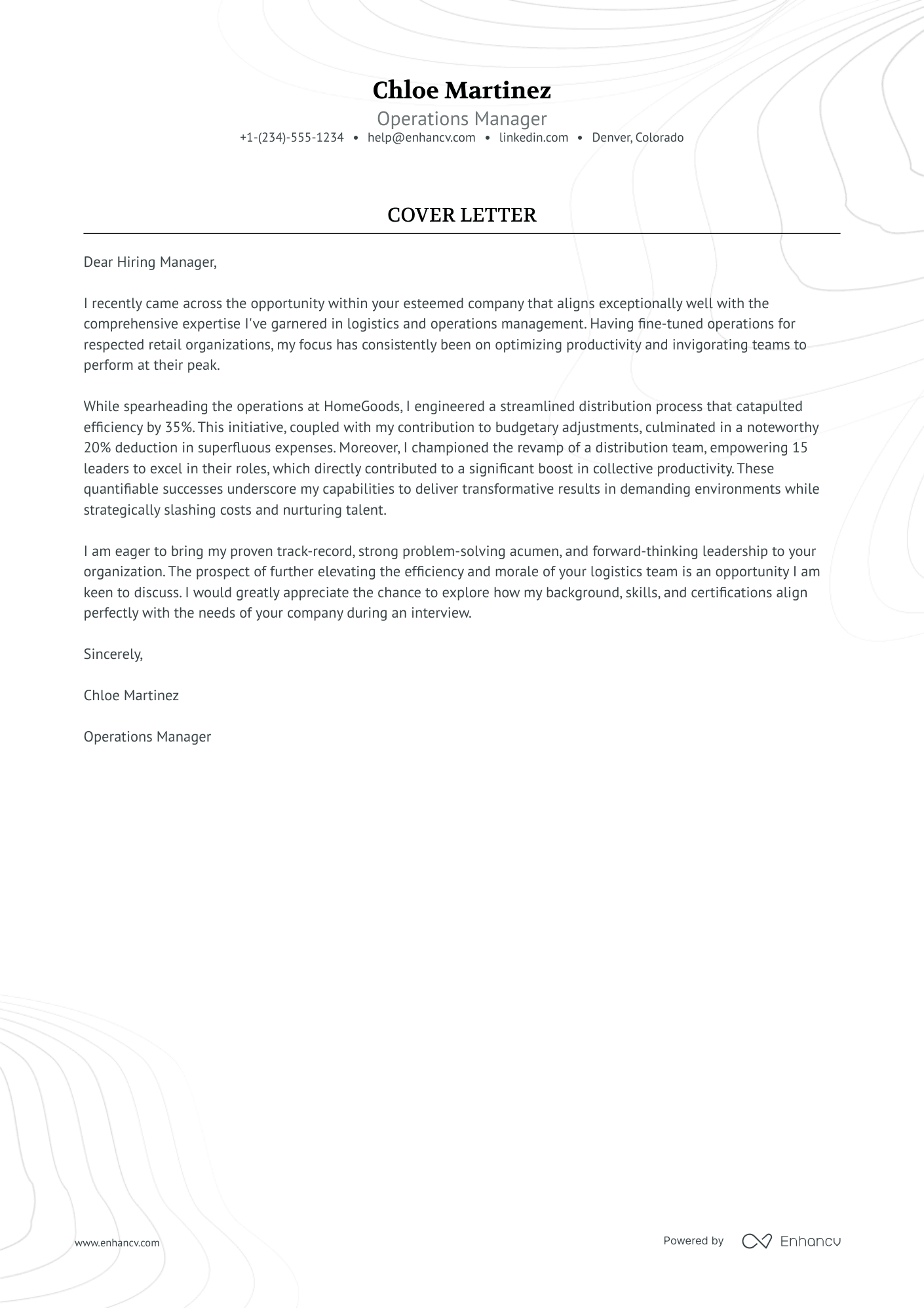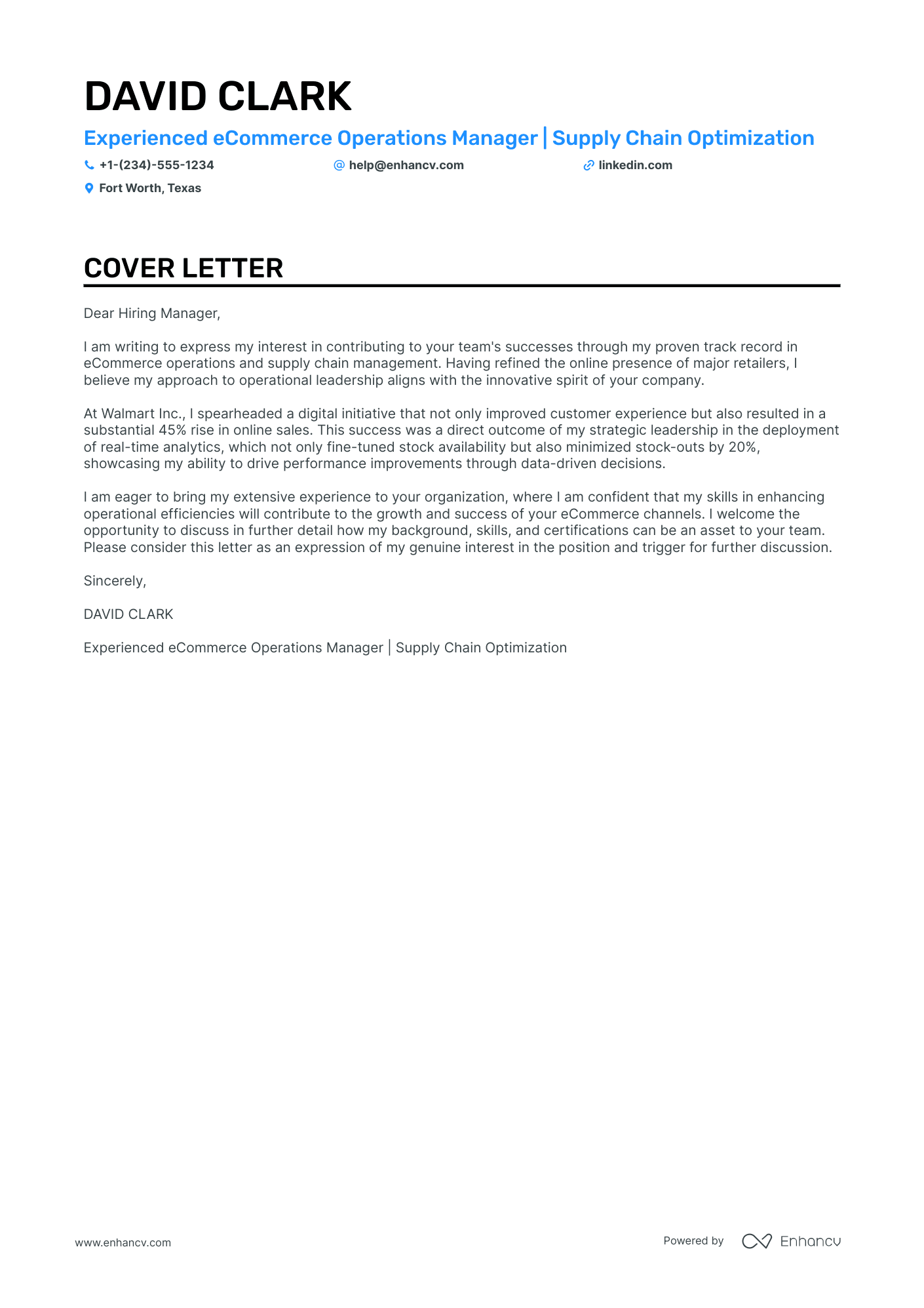Writing a compelling operations manager cover letter can be a daunting task, especially when you realize it's a crucial component of your job application. Unlike a resume, your cover letter is the stage to spotlight a professional triumph that showcases your skills. It's a balancing act between formal tone and genuine personality, avoiding worn-out phrases. Remember to keep it concise; a powerful tale of success is best delivered within the confines of a single page.
- Personalize the greeting to address the recruiter and your introduction that fits the role;
- Follow good examples for individual roles and industries from job-winning cover letters;
- Decide on your most noteworthy achievement to stand out;
- Format, download, and submit your operations manager cover letter, following the best HR practices.
Use the power of Enhancv's AI: drag and drop your operations manager resume, which will swiftly be converted into your job-winning cover letter.
If the operations manager isn't exactly the one you're looking for we have a plethora of cover letter examples for jobs like this one:
Drop your resume here or choose a file.
PDF & DOCX only. Max 2MB file size.
Operations manager cover letter example
ANDREW CLARK
Austin, TX
+1-(234)-555-1234
help@enhancv.com
- Quantifying Achievements: The cover letter effectively quantifies past achievements (33% improvement in productivity, $50,000 saved), which provides tangible evidence of the candidate's abilities and successes in operations management.
- Relevant Experience: It highlights the candidate's direct experience with operational strategies and workflow optimization, demonstrating their capability to handle similar responsibilities in the prospective role.
- Results-Focused: The language used emphasizes a focus on results, such as setting productivity records and improving the bottom line, appealing to employers who are looking for impact-driven candidates.
- Call to Action: The cover letter concludes with an invitation for an interview, prompting the hiring manager to take action, which is an effective strategy to prompt a response.
Designing your operations manager cover letter: what is the best format
Let's start with the basics, your operations manager cover letter should include your:
- Header
- Greeting
- Introduction
- Body paragraph
- Closing statement
- Signature (that's not a must)
Next, we'll move to the spacing of your operations manager cover letter, and yes, it should be single-spaced (automatically formatted for you in our cover letter templates).
Don't go for a old-school font (e.g. Arial or Times New Roman), but instead, pick an ATS-favorite like Chivo, Volkhov, or Raleway, to stand out.
Our cover letter builder is also set up for you with the standard one-inch margin, all around the text.
Finally, ensure your operations manager resume and cover letter are in the same font and are submitted in PDF (to keep the formatting in place).
P.S. The Applicant Tracker System (or ATS) won't be assessing your [job] cover letter, it's solely for the recruiters' eyes.
Skip the hassle of writing a cover letter. Use our free cover letter generator and get it done in moments.
The top sections on a operations manager cover letter
- Header: Include your name, contact information, and date to ensure the recruiter can easily reach you and knows when the application was submitted, which is especially important for operations manager positions where organization and contactability are key.
- Greeting: Address the cover letter to a specific individual, such as the hiring manager, to show attention to detail and personalization, crucial traits for an operations manager who must navigate interpersonal relationships professionally.
- Introduction: Briefly mention your current role, years of experience, and a standout achievement to quickly establish credibility and catch the recruiter's attention, signaling that you are a seasoned operations manager with a history of success.
- Body: Detail your relevant experience with specific examples, such as process improvements or leadership initiatives, to demonstrate your ability to effectively manage operations and lead teams towards organizational goals.
- Closing: Reiterate your interest in the role and the value you can bring to the company, suggesting a follow-up conversation, thereby showing your proactive approach and ability to take initiative—critical qualities for an operations manager.
Key qualities recruiters search for in a candidate’s cover letter
- Proven experience in optimizing operational processes: To demonstrate the ability to streamline workflows for efficiency and effectiveness.
- Strong leadership and team management skills: Essential for motivating employees, delegating tasks, and leading a team to achieve company goals.
- Excellent problem-solving abilities: Critical for identifying operational issues and developing innovative solutions to complex challenges.
- Proficiency in data analysis and performance metrics: To make informed decisions that improve operational performance and business profitability.
- Exceptional communication and interpersonal skills: These are necessary to liaise with various departments, manage stakeholder relationships, and ensure a cohesive organizational effort.
- Experience with budget management and cost control: Demonstrates the capability to manage resources effectively and maintain fiscal discipline within the company.
How to address hiring managers in your operations manager cover letter greeting
Goodbye, "Dear Sir/Madam" or "To whom it may concern!"
The salutation of your operations manager cover letter is how you kick off your professional communication with the hiring managers.
And you want it to start off a bit more personalized and tailored, to catch the recruiters' attention.
Take the time to find out who's recruiting for the role (via LinkedIn or the company page).
If you have previously chatted or emailed the hiring managers, address them on a first or last name basis.
The alternative is a "Dear HR team" or "Dear Hiring Manger", but remember that a "Dear Ms. Simmons" or "Dear Simon," could get you farther ahead than an impersonal greeting.
List of salutations you can use
- Dear Hiring Manager,
- Dear [Company Name] Team,
- Dear [Mr./Ms./Dr.] [Last Name],
- Dear [Position Title] Search Committee,
- Dear [Department Name] Recruiter,
The operations manager cover letter intro: aligning your interest with the company culture
You only have one chance at making a memorable first impression on recruiters with your operations manager cover letter.
Structure your introduction to be precise and to include no more than two sentences.
Here are some ideas on how to write a job-winning operations manager cover letter introduction:
- get creative - show off your personality from the get-go (if this aligns with the company culture);
- focus on your motivation - be specific when you say what gets you excited about this opportunity.
What to write in the body of your operations manager cover letter
Now that you've got your intro covered, here comes the heart and soul of your operations manager cover letter.
It's time to write the middle or body paragraphs. This is the space where you talk about your relevant talent in terms of hard skills (or technologies) and soft (or people and communication) skills.
Keep in mind that the cover letter has a different purpose from your operations manager resume.
Yes, you still have to be able to show recruiters what makes your experience unique (and applicable) to the role.
But, instead of just listing skills, aim to tell a story of your one, greatest accomplishment.
Select your achievement that:
- covers job-crucial skills;
- can be measured with tangible metrics;
- shows you in the best light.
Use the next three to six paragraphs to detail what this success has taught you, and also to sell your profile.
Closing paragraph basics: choose between a promise and a call to action
You've done all the hard work - congratulations! You've almost reached the end of your operations manager cover letter.
But how do you ensure recruiters, who have read your application this far, remember you?
Most operations manager professionals end their cover letter with a promise - hinting at their potential and what they plan on achieving if they're hired.
Another option would be to include a call for follow-up, where you remind recruiters that you're very interested in the opportunity (and look forward to hearing from them, soon).
Choose to close your operations manager cover letter in the way that best fits your personality.
What to write on your operations manager cover letter, when you have zero experience
The best advice for candidates, writing their operations manager cover letters with no experience, is this - be honest.
If you have no past professional roles in your portfolio, focus recruiters' attention on your strengths - like your unique, transferrable skill set (gained as a result of your whole life), backed up by one key achievement.
Or, maybe you dream big and have huge motivation to join the company. Use your operations manager cover letter to describe your career ambition - that one that keeps you up at night, dreaming about your future.
Finally, always ensure you've answered why employers should hire precisely you and how your skills would benefit their organization.
Key takeaways
Writing your operations manager cover letter doesn't need to turn into an endless quest, but instead:
- Create an individual operations manager cover letter for each role you apply to, based on job criteria (use our builder to transform your resume into a cover letter, which you could edit to match the job);
- Stick with the same font you've used in your resume (e.g. Raleway) and ensure your operations manager cover letter is single-spaced and has a one-inch margin all around;
- Introduce your enthusiasm for the role or the company at the beginning of your operations manager cover letter to make a good first impression;
- Align what matters most to the company by selecting just one achievement from your experience, that has taught you valuable skills and knowledge for the job;
- End your operations manager cover letter like any good story - with a promise for greatness or follow-up for an interview.
Operations Manager cover letter examples
By Experience
Senior Operations Manager
Experienced Operations Manager
Senior Clinical Operations Manager
By Role
